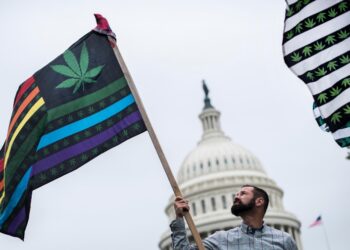
The fate of marijuana reform rests largely in the hands of our elected officials.
Ballot initiatives can introduce marijuana legalization into states and counties, but elected officials ultimately are responsible for shaping the policy, creating the programs, and implementing the will of the people. It doesn’t hurt when elected officials steering the legalization of marijuana believe in the benefits of cannabis and trust the public to make informed decisions on its use.
There is a lot of talk of the United States seeing nationwide legalization after Canada turned green on Oct. 17, 2018, but for true reform to happen, more politicians who understand cannabis need a seat at the table. As the Nov. 6, 2018, election draws near and races heat up, it can get messy when trying to draw political lines and cannabis stances.
So, Marijuana.com has put together the five most crucial-to-cannabis elections to follow.
To create this list, we picked competitive races in which the candidates’ views on cannabis largely differed. While it’s true that terms such as “pro-cannabis” and “marijuana reform” are often used too loosely, as pointed out by veteran cannabis reporter Tom Angell, we used the candidates’ campaign messaging, previous voting records, and National Organization for Reform of Marijuana Laws’ (NORML) endorsements to determine who is the “cannabis candidate” in each race. We also used FiveThirtyEight’s 2018 election forecasts and polling information to determine which races were competitive.
Here it is: Marijuana.com’s five most important 2018 midterm elections.
Texas / House — Pete Sessions vs. Colin Allred
The situation: Texas Republican Rep. Pete Sessions is the incumbent and chairman of the House Rules Committee. The Democratic candidate for the 32nd Congressional District is Collin Allred, a civil rights attorney and former NFL player.
The cannabis candidate: Allred, but not necessarily for his cannabis policies. The Democratic hopeful favors decriminalizing small amounts of marijuana and allowing the use of medicinal marijuana, according to Dallas News. Marijuana.com in October 2018 profiled a Texas couple in Sessions’ suburban Dallas district who are supporting Allred in the hopes of finding medical marijuana easier to obtain for their daughter, who has cerebral palsy and autism. Compared with Sessions’ longstanding and obstructionist cannabis positions, Allred becomes the de facto cannabis candidate.
Marijuana Policy Project Executive Director Rob Kampia once called Sessions a sphincter because Sessions routinely blocked numerous marijuana amendments as chairman of the House Rules Committee since 2016. Should Sessions lose his seat, a new chairman with a more balanced position on marijuana could be nominated by the Speaker of the House, potentially allowing more marijuana-measures to be considered on the floor.
The polls say: According to FiveThirtyEight’s Election 2018 House forecast on Oct. 26, 2018, Allred has a 3 in 8 chance of winning (38.7 percent), and Sessions has a 5 in 8 chance of winning (61.3 percent).
Arizona / Senate — Krysten Sinema vs. Martha McSally
The situation: Republican U.S. Sen. Jeff Flake is retiring and Republican Rep. Martha McSally and Democratic Rep. Krysten Sinema are vying for his seat in the Senate. And while Arizona is considered a red state — they haven’t sent a Democrat to the Senate since 1998 — they have a tendency of electing “mavericks,” according to the New York Times.
The cannabis candidate: Sinema. She hasn’t made a strong statement about cannabis, but has a good voting record when it comes to marijuana. Although she has voted against ending the federal prohibition on industrial hemp and cannabidiol (CBD) in the past, she has voted in favor of several marijuana measures, co-sponsored a cannabis banking bill, and was one of the representatives who signed a letter to New York U.S. Rep. José Serrano, ranking member of the House Subcommittee on Commerce, Justice, Science, and Related Agencies, asking to add an amendment protecting states’ marijuana laws.
Because Sessions has blocked all marijuana-policy from getting consideration on the House floor, McSally hasn’t had to cast a vote for or against marijuana legislation since 2016. But before the current dry spell, McSally received a C grade from NORML for her cannabis-voting record.
The polls say: It’s an incredibly close race. Sinema has a narrow lead, polling at 49.9 percent of the vote, and McSally is close behind with 48 percent, according to FiveThirtyEight’s Senate forecast.
Texas / Senate — Beto O’Rourke vs. Ted Cruz
The situation: Texas is a Republican stronghold, but don’t tell the Democratic hopeful Beto O’Rourke. The Democratic representative from Texas’ 16th Congressional District is taking the media’s election coverage by storm and racking up endorsements from NORML and Willie Nelson. He’s running against Republican stalwart, incumbent Sen. Ted Cruz, who seems to be continually running for president after he failed against Donald Trump in 2016.
The cannabis candidate: O’Rourke. He’s been clear on his support to end federal prohibition, has voted for marijuana-related bills during his time in the House, and has NORML’s endorsement, according to Marijuana Moment. Cruz hasn’t supported any cannabis-related policies and has used O’Rourke’s drug policy positions as a political wedge with voters.
The polls say: This is where O’Rourke’s meteoric rise may fall just short of landing him in the Senate and fulfilling Democrat’s hopes of turning Texas purple. O’Rourke is polling at 46.6 percent of the vote, with Cruz at a somewhat comfortable 51.9 percent, according to FiveThirtyEight’s forecast. O’Rourke has a 1 in 5 change of flipping the seat for the Democrats and marijuana legalization.
Florida / Governor — Andrew Gillum vs. Ron DeSantis
The situation: This is one of the most exciting gubernatorial races in the November election. Incumbent Republican Gov. Rick Scott is termed out after eight years and is bidding for a seat in the U.S. Senate. Contending for the top spot in Florida are former U.S. Rep. and current Donald Trump sycophant Ron DeSantis and Tallahassee mayor and Democratic hopeful Andrew Gillum.
The cannabis candidate: Gillum. He supports legalizing all forms of marijuana for recreational and medical uses and has been endorsed by NORML. Additionally, in a January 2018 tweet, he cited using the revenue from sales to fix public schools as one of the reasons to legalize marijuana.
DeSantis hasn’t necessarily taken a hard-line against marijuana, but he hasn’t been a champion of legalization by any means. He’s said he believes in implementing medical cannabis measures voted in by Florida voters, but feels that legalizing the recreational use of marijuana would make parenting young people harder, according to a Marijuana Moment analysis of the candidates.
The polls say: Gillum is leading with 50.9 percent of the vote over DeSantis’s 46.6 percent. Gillum has a 3 in 4 chance of winning; DeSantis has a 1 in 4 chance, according to FiveThirtyEight’s Governor forecast.
Wisconsin / Governor — Scott Walker vs. Tony Evers
The situation: Incumbent Republican Gov. Scott Walker is looking for a third term as Wisconsin’s governor. His challenger is Tony Evers, the state’s 66-year-old, spectacled superintendent of education who is campaigning on fixing the state’s education system in the face of teachers protesting over slashed funding and low wages.
According to Marijuana Moment, nearly half of Wisconsin voters will see marijuana-related ballot measures this election. The questions about whether to permit medical marijuana are advisory and non-binding. Whoever wins the governor’s office will oversee the implementation of future marijuana programs in the years to come.
The cannabis candidate: Evers. He’s campaigned on supporting medical marijuana legalization and said he would sign legislation that would allow its use, according to his website. When it comes to full marijuana legalization, he believes it’s up to the people of Wisconsin to determine the recreational use of cannabis.
Walker, on the other hand, is a staunch prohibitionist when it comes to marijuana. The icing on top: Walker called cannabis a “gateway drug” that opens up “other problems” in an interview with Milwaukee ABC affiliate WISN-TV.
The polls say: This. Election. Is. A. Toss-up! Evers has a 4 in 7 chance of winning with 49 percent of the vote, while Walker has a 3 in 7 chance of winning with 47.6 percent of the vote, according to FiveThirtyEight’s Governor forecast.












